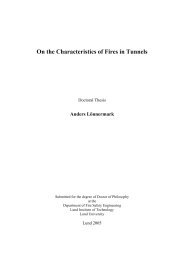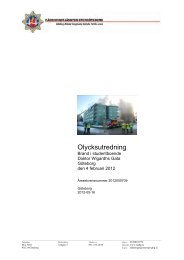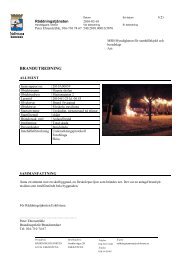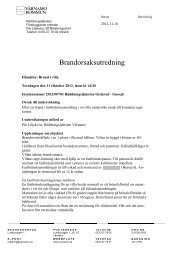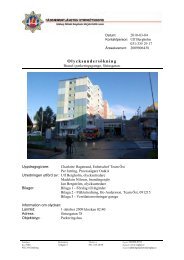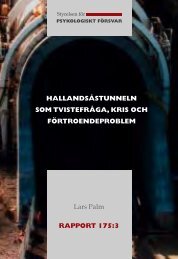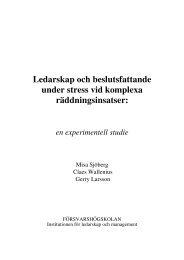Sverige
Sverige
Sverige
You also want an ePaper? Increase the reach of your titles
YUMPU automatically turns print PDFs into web optimized ePapers that Google loves.
14 kris och lärdom<br />
National-international comparison<br />
It may be relevant to compare local disaster response<br />
operations and crisis communications with similar<br />
activities at national and international/global level.<br />
The question becomes what similarities and differences<br />
exist. An introductory hypothesis for this study has<br />
been that the problems related to disasters increase as<br />
dimensions become more global, or inversely that less<br />
problems are encountered in relation to local disasters<br />
compared to national and especially international<br />
disasters.<br />
In one respect, an international and global disaster<br />
is always more problematic by nature because both<br />
the event and/or the resulting effects cross several geographical<br />
levels and are more complex than an event<br />
that is confined to local level. Several countries are<br />
involved in the disaster with different cultures and different<br />
legal and operational frameworks.<br />
Sweden has been involved in at least four international<br />
disasters during recent decades – Chernobyl<br />
1986, the Estonia Ferry disaster in 1994, the terror<br />
attacks in the United States in 2001 and the tsunami<br />
disaster in 2004 (Other events that attracted international<br />
or multinational coverage during this period<br />
include the BSE outbreak and the anthrax letters in<br />
2001). These events took place in other countries but<br />
had local consequences in Sweden. In one case – the<br />
Gothenburg disco fire in 1998 – the situation was reversed.<br />
A local event had a multinational impact because<br />
people from different national groups were directly<br />
affected which meant that their countries were<br />
indirectly affected.<br />
The international disasters must be considered serious<br />
and problematic events for Sweden, with political,<br />
management and communication repercussions (with<br />
reservation for the terror attacks, which were hardly<br />
a burden for Sweden). The absolute majority of these<br />
local events – with only local or regional scope – can<br />
hardly be classed as the same problematic type. Although<br />
some of them have been complex in that they<br />
involved several sectors and required a large-scale response,<br />
they have not led to more serious conflicts or<br />
other problems. Thus far the thesis that problems increase<br />
in relation to extreme events with an international/global<br />
nature is confirmed.<br />
It can also be assumed that the political dimension<br />
increases with the national and particularly international<br />
scope of a disaster. At a local level, political and<br />
policy expressions are limited, especially ideologically<br />
but also in terms of (discussion of) focus decisions,<br />
etc. The political arena is incorporated into the operational<br />
arena and assumes a disaster response role. The<br />
interpretation of Dutch researchers that disasters are<br />
strong political phenomena is hardly applicable for<br />
the two local disasters that were studied, except that<br />
politicians are more or less actively involved in the response<br />
operation and crisis communications.<br />
Public trust in the authorities and politics at local<br />
level has hardly been damaged by how these two<br />
events were handled. If anything, this study shows in<br />
a number of cases how public trust was strengthened<br />
by the disasters, even though this not been specifically<br />
studied. This corresponds to increased public trust in<br />
Swedish politicians that was measured after the September<br />
11 attacks (Holmberg & Weibull 2003), where<br />
the manner in which politicians handled the event was<br />
considered acceptable. Exceptions to increased trust<br />
can be noted, however, in the case of Chernobyl at<br />
the beginning of the studied period and the murder<br />
of a child during the latter part of the period (likewise<br />
the Government’s tsunami response at national<br />
level). Obvious exceptions at local level can also be<br />
noted for some public service companies, such as power<br />
and telecom providers in connection with the January<br />
storm.<br />
To round off the international aspect, it can be said<br />
that Sweden has not experienced any truly serious



